
In this issue, the Digest interviews Delisha Hinton, associate director of student and career services for recruitment and diversity in the College of Textiles. She has served in this position since March 2015. She earned a bachelor’s of science in textile technology with a concentration in medical textiles from NC State and will complete her master’s in higher education administration at NC State this spring. For the past six years, she has worked in higher education, specifically in the realm of recruitment, which has expanded her knowledge and interest in underserved populations.
What are the current diversity programs and initiatives in the College of Textiles, and how have they grown and developed?
Recruitment
This fall I launched MSEN (Math/Science Education Network) @ Textiles in conjunction with the MSEN Saturday Academy. MSEN @ Textiles infuses a textiles wearable device project into Saturday Academy. During the development phase of this project, two Saturday Academy teachers went through a one-day intensive training focused on science and engineering disciplines with ASSIST. From the training, teachers have been able to guide students through the engineering design thinking process as students create their own wearable device focused on One Health.
Student Engagement
This spring, I will launch our Multicultural Excellence Series, which focuses on the social engagement and professional development of our students who identify as African-American/Black, Hispanic/Latinx, Asian, Pacific Islander and Native American. This series is intended to bring the College of Textiles’ multicultural students together to expand their professional skill set and network, form and develop relationships with one another and create an environment that enhances student success in and out of the classroom.
Faculty/Staff Development
The College of Textiles is working on a cultural competence development plan for all of its faculty and staff. This plan first began with faculty and staff taking part in the NCBI Building Bridges workshop last spring; since then faculty have been offered the opportunity to attend the Fostering Inclusivity in the Classroom workshop offered by the Office for Institutional Equity and Diversity. This workshop identified diversity skills that faculty want to learn more about to better assist their students in everyday life challenges and to infuse diversity practices into their classrooms. These workshops have begun to lay the foundation of cultural competence from a top-down approach with the intention of faculty and staff being knowledgeable and aware and able to address issues of diversity with their colleagues and students.
What are the major goals and areas of focus of your work in the College of Textiles?
The major goals and areas of focus within my work are to complete the development of our college cultural competence plan and enhance our recruitment efforts to increase the number of underserved populations in the College of Textiles. My role oversees all of recruitment and diversity within the College of Textiles, so this involves blending the two whenever possible but also maintaining individual initiatives within each area. Although I can blend the two a majority of the time, many of my current initiatives are focused independently of each other to enhance the educational experiences of all of our students at the same time that faculty and staff are becoming more culturally competent in an evolving society and we increase the diversity of our student population.
Beyond the recruitment and diversity initiatives and programs that have begun, as well as future programs, it is my goal to create a welcoming, safe and supportive environment for all of our faculty, staff and students in the College of Textiles. Achieving this goal takes the work beyond me and into the College of Textiles as a whole, being a family unit working together to ensure the success of one another.
Do you have any additional thoughts or reflections regarding diversity, equity and inclusion at NC State and how you hope to see NC State changing in the coming years?
As an NC State graduate, I have seen the growth and challenges NC State has faced from both sides. Although our work has its ups and downs, we must all continue to challenge one another to create an inclusive environment. To be able to do so, we must take the time to listen to one another, understand the challenges we currently face and work as a collective to create solutions. The solutions we create must involve all of the constituents of the university and continue to evolve over time. It is on us to speak and listen to our students and to understand their needs and what we can do to elevate them to the next level.